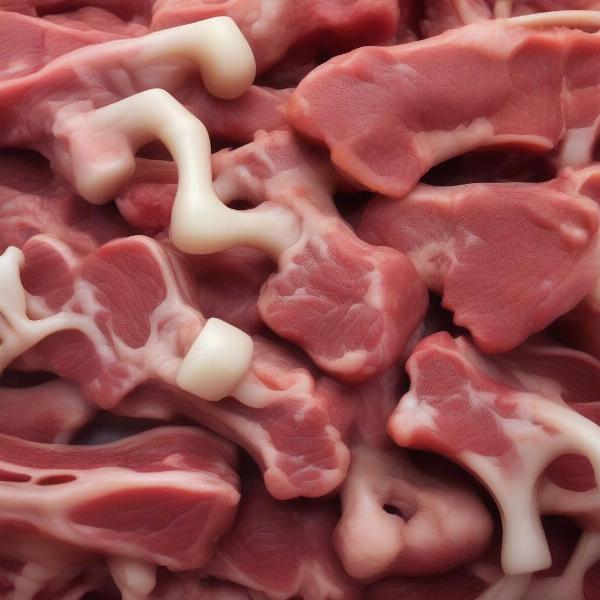Neck bones are a popular treat for dogs, but are they safe? The answer isn’t a simple yes or no. Whether or not a dog can safely eat neck bones depends on a variety of factors, including the type of bone, how it’s prepared, and the individual dog’s size, age, and health. This article will delve into the potential benefits and risks of feeding your dog neck bones, providing you with the information you need to make an informed decision.
Many dog owners are drawn to neck bones because they are a natural source of nutrients like calcium and phosphorus. They can also help satisfy a dog’s natural chewing instincts and keep their teeth clean. However, there are also some significant risks associated with feeding neck bones, particularly cooked bones.
Cooked vs. Raw Neck Bones: A Crucial Distinction
The biggest danger with neck bones comes from cooked bones. Cooking makes bones brittle and prone to splintering. These sharp splinters can cause serious damage to a dog’s digestive tract, leading to choking, punctures, blockages, and even death. Therefore, cooked neck bones should never be given to dogs.
Raw bones, on the other hand, are softer and less likely to splinter. However, even raw bones pose some risks. They can still cause blockages, particularly in smaller dogs or those prone to gulping their food.
 Raw Dog Neck Bones
Raw Dog Neck Bones
What Types of Neck Bones Are Safe (If Any)?
If you’re considering giving your dog neck bones, raw beef or lamb neck bones are generally considered the safest options. They are larger and denser than chicken or pork neck bones, making them less likely to splinter. However, it’s important to supervise your dog closely whenever they are chewing on any type of bone.
Potential Benefits and Risks of Feeding Neck Bones
Benefits:
- Provides essential nutrients like calcium and phosphorus.
- Satisfies chewing instincts.
- Helps clean teeth.
- Can provide mental stimulation.
Risks:
- Splintering (cooked bones): This is the most serious risk and can lead to life-threatening injuries.
- Blockages: Even raw bones can cause blockages in the digestive tract.
- Broken teeth: Aggressive chewers can potentially break their teeth on bones.
- Bacterial contamination: Raw bones can carry bacteria like Salmonella.
How to Safely Feed Neck Bones (If You Choose To)
- Always choose raw bones: Never give your dog cooked bones.
- Supervise closely: Never leave your dog unattended with a bone.
- Select appropriate size: Choose bones that are too large for your dog to swallow whole.
- Discard after a few hours: Don’t let your dog chew on the same bone for extended periods.
- Freeze for storage: Freezing can help reduce the risk of bacterial contamination.
- Consult your veterinarian: Talk to your vet before introducing neck bones, especially if your dog has any underlying health conditions.
Conclusion
While neck bones can offer some benefits for dogs, they also come with potential risks. It’s crucial to understand these risks and take appropriate precautions if you decide to feed them. Remember, cooked bones are absolutely off-limits, and even raw bones require careful supervision. Ultimately, the best way to ensure your dog’s safety and well-being is to consult with your veterinarian. They can provide personalized advice based on your dog’s individual needs and health status.
FAQ
- Can puppies eat neck bones? It’s generally best to avoid giving neck bones to puppies as their teeth are still developing and they are more likely to swallow large pieces.
- What should I do if my dog swallows a bone splinter? Contact your veterinarian immediately.
- Are there any alternatives to neck bones? Yes, there are many safe and healthy chew toys available that can satisfy your dog’s chewing instincts.
- Can I give my dog smoked neck bones? No, smoked bones are just as dangerous as cooked bones and should be avoided.
- How often can I give my dog neck bones? If you choose to feed neck bones, do so sparingly and always under supervision.
- Can senior dogs eat neck bones? Senior dogs with dental issues should avoid neck bones, as they might be too hard for them to chew.
- Are there any specific breeds that should avoid neck bones? Smaller breeds and dogs with sensitive stomachs are more prone to issues with neck bones.
can dogs eat pork neck bones
dog collar with bones
raw chicken bones for dogs
necklace with dog paw
About ILM Dog
ILM Dog is your trusted international resource for all things dog-related. We’re dedicated to providing expert advice on dog breeds, health, training, nutrition, grooming, and much more. From puppy care to senior dog care, we cover every stage of your dog’s life. Need help choosing the right breed for your lifestyle or advice on dog nutrition? Contact us today! Email: [email protected], Phone: +44 20-3965-8624.